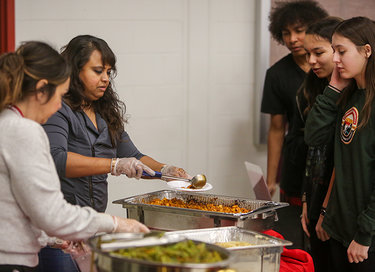Inclusion means everyone is seated at the table, able to benefit from one another
We so often hear the phrase “diversity, equity, and inclusion,” that we may not stop to think what it means. The phrase is now known by its initials, DEI, and has been at the center of political controversies nationwide.
Many government agencies, businesses, and schools in the wake of George Floyd’s murder adopted DEI policies. The Guilderland school district was one of them and has worked to include everyone.
We interviewed the district’s first DEI director, Matthew Pinchinat, soon after he was appointed in 2021. A Black social studies teacher whose parents had come from Haiti, Pinchinat was beloved by his students.
We asked him to unpack the meaning of DEI for us. Diversity, he said, means recognizing people who are not from our background, and includes differences in thought as well.
Equity doesn’t mean everyone gets the exact same thing, Pinchinat said, describing an image where three people are trying to look over a solid fence to see a ball game. If they all were given equal crates to stand on, one person would be towering over the fence, a second would be at just the right height, and the third still couldn’t see over.
Rather, Pinchinat said, giving each what he needs would be equity.
Inclusion, he said, is having everyone seated at the table, able to benefit from one another.
The district’s current DEI director, Derek Westbrook, a poet who has taught in prisons, held a school assembly last fall soon after he was appointed in which he explained how each human being exists on three levels.
The first is we are all part of the human race, sharing that in common. The second is we each come from a culture, whether its geographic, racial, ethnic, or religious. And the third is that each one of us is an individual unlike any other.
Soon after, the district’s superintendent, Marie Wiles, told us, “Our work is recognizing that everybody is all three of those things.” She went on, “We take very seriously the obligation and the responsibility that we have to make sure that each child feels like they belong, that they’re part of our school community, and that we’re providing for them the opportunities to learn and grow and develop and change and find joy in being in our classrooms and on our campus.”
We thought of these words as we covered the district’s budget process unfolding this year. Next year’s spending plan is, after all, a blueprint of what the district values.
Enthusiastic girls told the school board about their love of flag football and their desire to have a school team. The father of one of the girls called it an equity issue.
We agree that it is. Flag football allows girls to participate in a sport that has been nearly exclusively male.
In flag football, athletes stop play not by tackling an opponent but rather by pulling a flag from an opponent’s waist band. Being a no-contact sport, flag football favors speed and agility rather than muscle and power.
Through the course of several meetings, relatives of special-needs students at the high school told the school board that they were not being included.
We were particularly moved by Claire Depew, speaking to the board on behalf of her brother, who sat behind her as did her parents. “He’s come home sad,” said Claire. “When he was in the middle school with me, he came home happy every day …. Now he barely sees all of his friends that aren’t in self-contained classes.”
Nancy Marmet broke our heart when she spoke of her son, Alex, a 10th-grader at the high school with cerebral palsy. Most of the time her son eats with a teaching assistant at school.
“It’s not been since elementary school that anyone has ever asked him to do something outside of school,” Marmet said. “And he would love to do that.”
She went on, “And, when I tried to get him to ask people, he’s like, ‘Well, I don’t think they’ll want to do that with me.’”
Inclusion is important not just for people of different races or religions or income levels but also for people of different abilities.
We were pleased that, after these concerns were voiced, the draft for next year’s budget now includes funding for a varsity flag football team in the spring of 2025 and a third section of Comprehensive Skills, a class for special needs students at the high school
Of course, more needs to be done. Working towards inclusion of everyone is a never-ending process. But the school district is heading in the right direction.
We urge the town of Guilderland to take a page from the school’s playbook.
At the urging of Muslim students, Guilderland is granting Eid as a holiday this year. Eid al-Fitr is celebrated at the end of Ramadan, on April 9 and 10 this year, with a community-wide prayer service and a celebratory end to a month of fasting as meals are shared with family and friends.
School board members discussed granting the holiday over months because, as with developing a budget, granting one need often means negating another.
We remember one school board member having a moment of revelation as a Muslim student likened Eid to Christmas, asking what it would be like for Christians to go to school on that day.
Until that moment, the board member simply hadn’t grasped the importance of the holiday. It is easy to understand and accept what we are used to, what we were raised with.
It is harder to grasp the unfamiliar.
We expect that many of those Guilderland Muslim students will be eating halal meals as they celebrate Eid, which brings us to the point of this editorial. How far will Muslims living in Guilderland have to travel to get their food?
There are approximately 60 state-certified halal food manufacturers, producers, packers, and distributors in New York state, nearly all are located in New York City. Almadina Market in Clifton Park is the only state-certified halal business in the area.
In January, reporter Sean Mulkerrin wrote about plans Imran Hassan had to open a Halal market at the site of a closed computer shop on Western Avenue in Guilderland. Mulkerrin has continued to follow the story.
“Guilderland is a very good area,” Hassan told Mulkerrin. “There’s so many good people living there, and so many from our community living there,” he said of the Muslim community.
We were pleased at the January town board meeting when Supervisor Peter Barber spoke out about concerns he’d heard over the halal market.
“I know people refer to it as a slaughterhouse, which I think is an unfair characterization,” said Barber. “‘Halal’ means it’s an Islamic Muslim meat market. ‘Hala’ means permissive or legal. I’m not an expert on it, but basically it means food has to be prepared in a certain way.”
Barber noted the operation would have to be certified and inspected by the state. “It has to be done a certain way … which is no blood being spilled,” Barber said.
But then we were disappointed when first the Albany County Planning Board recommended against permitting the market and then the Guilderland zoning board denied the special-use permit the market needed to open.
The county board advised that the zoning board “consider the land use compatibility of the proposed use of poultry with the adjacent residential properties and the precedent setting nature of allowing such uses.”
Guilderland’s planner, Kenneth Kovalchik, wrote that the county planning board’s “comment pertaining to compatibility is unfounded and lacks merit”; as a local retail use, he wrote, the market was a permitted use in the zoning district, “subject to special use permit approval by the Zoning Board of Appeals.”
Kovalchik argued case law had settled any issues “related to compatibility of land uses,” noting the county board had recently recommended disapproval of a local “project based on compatibility,” Costco Wholesale.
Kovalchik also said that the technical arguments posited by the county as means for disapproval weren’t tenable, noting the market setbacks would exceed code.
He went so far as to say the county board’s statement “could be viewed by many to be the equivalent to religious discrimination.”
A dozen residents who spoke to the zoning board raised concerns about the noise and smell that would result from the slaughtering of animals, feeling it would threaten their property values and quality of life.
Savita Hanspal, who spoke on behalf of the project’s four partners, said there would be minimal noise and odor due to the building being built of brick with a separate room for slaughtering; its doors would be closed to prevent noise from disturbing the neighbors, she said.
In addition, she noted, the building is buffered on one side by a cemetery, another by parking spots; a restaurant and five lanes of Western Avenue make up the remaining boundaries.
Hanspal said cleanliness and hygiene would be a priority, ensuring the well-being of the poultry and maintaining customer satisfaction. The preparation of halal meat involves specific steps, including that the animal is to be treated humanely, and killed as quickly and painlessly as possible.
While the zoning board determined that approving the market would not have a significant adverse impact on the environment, a motion to approve the special-use permit was not made and seconded so the board did not even discuss the matter.
There are markets in Guilderland where poultry and meat of various kinds are butchered and sold to customers; these markets are closer to homes than the proposed halal site would have been. Guilderland also has restaurants near homes that boil live lobsters for patrons to eat.
None of this raises an eyebrow because we are used to it.
The word “discrimination” as used by Kovalchik is a harsh one; one letter writer called it “rhetoric that is contrived hate-mongering and recklessly irresponsible.”
She correctly noted that these are polarizing and divisive times, but we understood what Kovalchik meant. In such times, it is important to find our common humanity as Guilderland’s DEI director has advised.
No one likes to be thought of as prejudiced but most of us easily accept the familiar while questioning or eschewing the foreign, the unfamiliar.
We are pleased that Guilderland is becoming a more diverse community; we are all richer for it. And, while the schools are leading the way on inclusion, we adults need to catch up.
Earlier this year, Aneesa Waheed, the owner of Tara Kitchen, was invited to Farnsworth Middle School to share Moroccan food, unfamiliar to many of the students. We love the picture Michael Koff took of Waheed serving marinated chicken in apricot and prune sauce.
The pictured eighth-graders look hesitant, perhaps fearful regarding the unfamiliar food.
But, once they gave it a try, their responses were enthusiastic. They had been coaxed into experiencing something unfamiliar and came to understand and like something new.
We’re not going to apply a harsh term to the four zoning board members who voted against the halal market.
Rather, we would encourage them along with the residents who spoke out against the market to get to know their Muslim neighbors, to sample their food, to understand why halal is important to them, much as keeping kosher is important to some of their Jewish neighbors.
Almost every year, we cover a feast held at Farnsworth Middle School where students and their families who have come to Guilderland from around the world bring food from their homelands and share a meal together.
It is a wonderful tradition that teaches the lesson presented by Derek Westbrook. Each of us is unique, yes, but we are each also part of a heritage or tradition and, at rock bottom, we share a common humanity.
Inclusion, after all, is having everyone seated at the table, able to benefit from one another.


